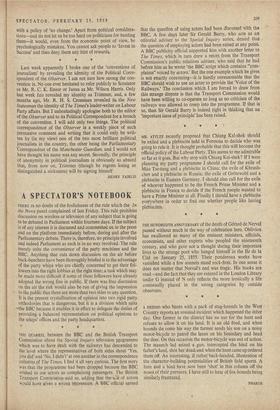THE QUARREL between the BBC and the British Transport Conrmission
about the Special Inquiry television programme which was to have dealt with the railways has descended to the level where the representatives of both sides shout 'Yes, you did' and `No, I didn't' at one another in the correspondence columns of The Times. I find it all very curious. The first story was that the programme had been dropped because the BBC wished to use actors as complaining passengers. The British Transport Commission- said so, adding that the 1.8„e of actors would have given a wrong impression. A BBC official agreed that the question of using actors had been discussed with the BBC. A few days later Sir Gerald Barry, who acts as an editorial adviser to the Special inquiry series, denied that the question of employing actors had been raised at any point. A BBC publicity official supported him with another letter to The Times, which in turn drew a retort from the Transport Commission's public relations adviser, who said that he had before him as he wrote 'the BBC script which contains "com- plaints" voiced by actors.' But the one example which he gives is not exactly convincing—it is hardly unreasonable that the BBC should wish to use an actor to provide the 'Voice of the Railways.' The conclusion which I am forced to draw from this strange dispute is that the Transport Commission would have been willing to co-operate so long as no criticism of the railways was allowed to creep into the programme. If that is so, then Sir Gerald Barry is indeed right in thinking that an `important issue of principle' has been raised.
••










































 Previous page
Previous page